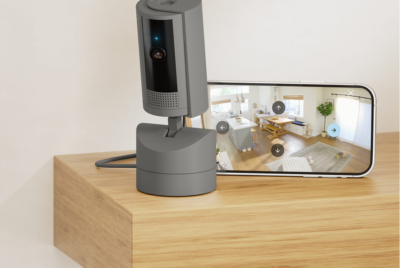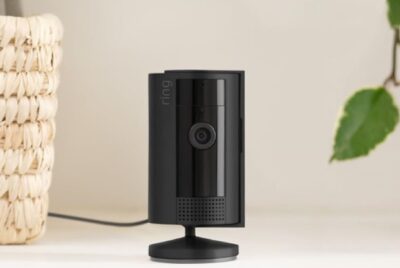Cellular Security Cameras
Cellular security cameras are devices that help protect your home and loved ones using a wireless cellular connection. These cameras are particularly useful for monitoring your home when you’re away, whether it’s for a short trip to the grocery store or an extended vacation. If there is unexpected activity, the camera sends alerts to your phone so you can check the live feed or review recorded footage in real-time.
Additionally, cellular security cameras are easy to install and don’t require complicated wiring or a strong Wi-Fi signal, making them suitable for remote or even rural areas. They’re also weatherproof, so they can withstand rain, snow, and extreme temperatures, ensuring reliable performance year-round.
Types of Cellular Security Cameras
Indoor Cellular Cameras
Indoor cellular cameras are ideal for monitoring the interior of your home. They are an excellent choice for keeping an eye on children, pets, or household staff when you are away. With remote access, you can check on your home from anywhere, offering peace of mind.
Outdoor Cellular Cameras
Outdoor cellular cameras are built to withstand various weather conditions, making them suitable for monitoring the exterior of your property. These cameras are essential for deterring potential intruders and providing evidence in case of any security breaches.
Advantages of Cellular Security Cameras
Remote Monitoring
One of the significant advantages of cellular security cameras is the ability to monitor your property remotely. As long as the camera has a cellular connection, you can access live feeds and recorded footage through a smartphone app or web portal.
Quick and Easy Installation
Cellular security cameras do not rely on complicated wiring or Wi-Fi setups, making installation a breeze. You can set up these cameras in minutes without the need for professional assistance.
Real-Time Alerts and Notifications
Cellular cameras offer real-time alerts and notifications when motion is detected. You will receive instant updates on your phone, allowing you to respond promptly to any potential security threats.
No Dependence on Wi-Fi or Landline
Unlike Wi-Fi cameras that rely on a stable internet connection, cellular cameras operate independently using cellular networks. This independence ensures continuous surveillance even during internet outages.
Limitations of Cellular Security Cameras
Monthly Service Fees
While cellular cameras provide added convenience, they come with monthly service fees for data plans. It’s essential to consider these ongoing costs before investing in a cellular security system.
Cellular Network Coverage
The effectiveness of cellular cameras depends on the strength of the cellular network in your area. Ensure that your location has adequate cellular coverage for seamless camera performance.
Potential Signal Interference
In areas with heavy cellular network usage or signal congestion, you may experience occasional signal interference. This could affect the camera’s performance and data transmission.
Factors to Consider Before Buying Cellular Security Cameras
Camera Resolution and Quality
Opt for cameras with higher resolution and image quality to ensure clear and detailed footage.
Night Vision Capabilities
Choose cameras with advanced night vision capabilities to monitor your property effectively in low-light conditions.
Motion Detection and Alerts
Look for cameras with customizable motion detection settings, allowing you to fine-tune notifications according to your preferences.
Storage Options
Consider the camera’s storage options, such as cloud storage or local storage via SD cards.
Weather Resistance
For outdoor cameras, opt for weather-resistant models that can withstand rain, snow, and extreme temperatures.
Best Practices for Setting Up Cellular Security Systems
Ideal Camera Placement: Strategically place cameras in areas with high foot traffic or vulnerable entry points.
Securing Power Sources: Ensure stable power sources for uninterrupted camera operation.
Testing and Troubleshooting: Before relying on the system entirely, conduct thorough testing and address any technical issues.
Comparing Cellular Security Cameras with Other Types
Cellular vs. Wi-Fi Security Cameras
Both Cellular and Wi-Fi security cameras have their merits, but cellular cameras offer more flexibility and independence, making them a preferred choice for remote locations.
Cellular vs. Wired Security Cameras
While wired security cameras are reliable, cellular cameras eliminate the need for complex wiring, making them easier to install and manage.
My Personal Experience with Cellular Security Cameras
As someone who has always been passionate about security and technology, I was naturally drawn to the concept of cellular security cameras. A few years ago, I decided to invest in a cellular home security system to protect my property and loved ones. The experience has been nothing short of impressive.
Seamless Remote Monitoring
One of the standout features of my cellular security cameras is the seamless remote monitoring capability. Whether I’m at work, on vacation, or simply running errands, I can access the live feed from my cameras using a user-friendly app on my smartphone. The high-resolution video feed provides crystal-clear visuals, giving me peace of mind and control over my home’s security.
Quick and Hassle-Free Installation
Setting up my cellular security cameras was a breeze. Without the need for complex wiring or dependency on a stable Wi-Fi network, I could position the cameras exactly where I wanted them. I had the flexibility to mount outdoor cameras at strategic angles and place indoor cameras in areas I deemed most vulnerable.
Real-Time Alerts and Notifications
The real-time alerts and notifications have been a game-changer for me. As soon as motion is detected within the camera’s field of view, I receive instant notifications on my phone. Whether it’s a package delivery, a family member arriving home, or even a potential intruder, I’m always in the know. This level of awareness has empowered me to take appropriate action when needed.
No Wi-Fi Dependency
One of the primary reasons I opted for cellular security cameras was their independence from Wi-Fi networks. In the past, I had experienced instances where my Wi-Fi would go down during power outages or due to technical issues. With cellular cameras, I no longer have to worry about internet connectivity disruptions. They continue to function flawlessly, providing me with a consistent security solution.
Choosing the Best Type of Cellular Camera
When I first explored cellular security cameras, I was torn between the idea of a cellular trail camera and a cellular home security camera. However, considering my needs for both indoor and outdoor surveillance, I decided to go with a combination of indoor and outdoor cellular cameras.
For indoor monitoring, I opted for a compact and discreet indoor cellular camera that blends seamlessly into my home’s decor. Its night vision capabilities and two-way audio allow me to keep an eye on my pets and communicate with family members even when I’m away.
As for outdoor surveillance, I invested in a rugged outdoor cellular camera with weather-resistant features. This camera has withstood heavy rain and extreme temperatures without compromising its performance. The extended battery life and reliable motion detection make it an ideal choice for safeguarding the perimeter of my property.
My Recommendations
Coming soon: Based on my personal experience and research, I wholeheartedly recommend cellular security cameras for anyone looking to enhance their home or property security. For a comprehensive setup, consider a mix of indoor and outdoor cameras to cover all vulnerable areas.
Conclusion
Cellular security cameras and systems have undoubtedly revolutionized the way we approach security. As an enthusiast and advisor, I can confidently say that their advantages, such as remote monitoring, easy installation, and real-time alerts, make them a valuable investment for anyone concerned about the safety of their property. By considering factors like camera types, resolution, and night vision capabilities, you can find the perfect cellular security camera setup to suit your unique needs. With my recommendations in mind, take the next step towards bolstering your security and gaining peace of mind.
FAQ’s
- Can I use cellular security cameras in areas with limited cellular coverage?
While cellular security cameras require a strong cellular signal for optimal performance, some models come with external antennas or signal boosters to improve reception. However, in areas with extremely limited or no cellular coverage, these cameras may not function effectively. It’s essential to check the cellular network coverage in your specific location before purchasing cellular security cameras.
- Are cellular security cameras susceptible to hacking?
Cameras of this type use encrypted communication protocols to transmit data over cellular networks, making them less susceptible to hacking compared to traditional Wi-Fi cameras. However, as with any connected device, it’s crucial to follow security best practices, such as using strong passwords and regularly updating firmware, to minimize the risk of unauthorized access.
- Do cellular security cameras require a SIM card?
Yes, most cameras of this type require a compatible SIM card to establish a cellular connection. Some cameras come with built-in SIM cards, while others may require you to purchase and insert a SIM card from a compatible cellular network provider.
- Can I access cellular security camera footage if I travel internationally?
Yes, you can access your cellular security camera footage when traveling internationally, provided that your cellular camera and SIM card are compatible with international networks. Be mindful of potential roaming charges or data usage fees that may apply while accessing footage from abroad.
- How do cellular security cameras handle power outages?
The built-in batteries allow these cameras to continue to operating during power outages, ensuring uninterrupted surveillance. Additionally, cameras that support external battery packs or solar panels can offer extended power backup. However, it’s essential to monitor the camera’s battery levels and have a reliable power backup solution in place to avoid gaps in surveillance during prolonged power outages.




